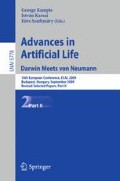Abstract
In this work we present the practical application of the Asynchronous Situated Coevolution (ASiCo) algorithm to a special type of vehicle routing problem, the heterogeneous fleet vehicle routing problem with time windows (HVRPTW). It consists in simultaneously determining the composition and the routing of a fleet of heterogeneous vehicles in order to serve a set of time-constrained delivery demands. The ASiCo algorithm performs a situated coevolution process inspired on those typical of the Artificial Life field that has been improved with a strategy to guide the evolution towards a design objective. This strategy is based on the principled evaluation function selection for evolving coordinated multirobot systems developed by Agogino and Tumer. ASiCo has been designed to solve dynamic, distributed and combinatorial optimization problems in a completely decentralized way, resulting in an alternative approach to be applied to several engineering optimization domains where current algorithms perform unsatisfactorily.
Access this chapter
Tax calculation will be finalised at checkout
Purchases are for personal use only
Preview
Unable to display preview. Download preview PDF.
References
Doerner, K.F., Gendreau, M., Greistorfer, P., Gutjahr, W., Hartl, R.F., Reimann, M.: Metaheuristics, Progress in Complex Systems Optimization. Operations Research/Computer Science Interfaces Series, vol. 39. Springer, Heidelberg (2007)
Langton, C.: Artificial Life: an Overview. MIT Press, Cambridge (1997)
Satoh, T., Uchibori, A., Tanaka, K.: Artificial life system for optimization of nonconvex functions, vol. 4, pp. 2390–2393 (1999)
Yang, B.S., Lee, Y.H.: Artificial life algorithm for function optimization. In: Proceedings of 2000 ASME Design Engineering Technical Conferences and Computers and Information in Engineering Conference (2000)
Yang, B., Lee, Y., Choi, B., Kim, H.: Optimum design of short journal bearings by artificial life algorithm. Tribology International 34(7), 427–435 (2001)
Ahn, Y.K., Song, J.D., Yang, B.: Optimal design of engine mount using an artificial life algorithm. Journal of Sound and Vibration 261(2), 309–328 (2003)
Watson, R.A., Ficici, S.G., Pollack, J.B.: Embodied Evolution: Distributing an Evolutionary Algorithm in a Population of Robots. Robotics and Autonomous Systems 39(1), 1–18 (2002)
Prieto, A., Duro, R.J., Bellas, F.: Obtaining Optimization Algorithms through an Evolutionary Complex System. In: Abstracts booklet ECCS 2007, pp. 132–132. European Complex Systems Society (2007)
Prieto, A.: Estudio de la coevolución asíncrona situada para la resolución de problemas dinámicos descentralizados en ingeniería, Ph. D. Thesis, Universidade da Coruña (2009)
Schut, M.C., Haasdijk, E., Prieto, A.: Is Situated Evolution an Alternative for Classical Evolution? To appear in Proceedings CEC 2009 (2009)
Agogino, A., Tumer, K.: Efficient evaluation functions for evolving coordination. Evolutionary Computation 16(2), 257–288 (2008)
Imrana, A., Salhi, S., Wassana, N.: A variable neighborhood-based heuristic for the heterogeneous fleet vehicle routing problem. European Journal of Operational Research 197(2,1), 509–518 (2009)
Paraskevopoulos, D., Repoussis, P., Tarantilis, C., Ioannou, G., Prastacos, G.: A reactive variable neighborhood tabu search for the heterogeneous fleet vehicle routing problem with time windows. Journal of Heuristics 14(5), 425–455 (2008)
Lima, C., Goldbarg, M., Goldbarg, E.: A Memetic Algorithm for the Heterogeneous Fleet Vehicle Routing Problem. Electronic Notes in Discrete Math. 18, 171–176 (2004)
Stopford, M.: Is the drive for ever bigger containerships irresistible? In: Lloyds List Shipping Forecasting Conference (2002)
Author information
Authors and Affiliations
Editor information
Editors and Affiliations
Rights and permissions
Copyright information
© 2011 Springer-Verlag Berlin Heidelberg
About this paper
Cite this paper
Prieto, A., Bellas, F., Caamaño, P., Duro, R.J. (2011). Solving a Heterogeneous Fleet Vehicle Routing Problem with Time Windows through the Asynchronous Situated Coevolution Algorithm. In: Kampis, G., Karsai, I., Szathmáry, E. (eds) Advances in Artificial Life. Darwin Meets von Neumann. ECAL 2009. Lecture Notes in Computer Science(), vol 5778. Springer, Berlin, Heidelberg. https://doi.org/10.1007/978-3-642-21314-4_25
Download citation
DOI: https://doi.org/10.1007/978-3-642-21314-4_25
Publisher Name: Springer, Berlin, Heidelberg
Print ISBN: 978-3-642-21313-7
Online ISBN: 978-3-642-21314-4
eBook Packages: Computer ScienceComputer Science (R0)

